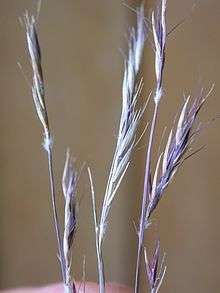Bouteloua eriopoda
| Bouteloua eriopoda | |
|---|---|
 | |
| Scientific classification | |
| Kingdom: | Plantae |
| (unranked): | Angiosperms |
| (unranked): | Monocots |
| (unranked): | Commelinids |
| Order: | Poales |
| Family: | Poaceae |
| Genus: | Bouteloua |
| Species: | B. eriopoda |
| Binomial name | |
| Bouteloua eriopoda (Torr.) Torr.[1] | |
| Synonyms | |
Bouteloua eriopoda, commonly known as black grama, is a perennial prairie grass that is native to the Southwestern United States. Its main means of reproduction is by stolons, as its ratio of viable seeds to sterile ones is naturally low. The disparity may play a role in its lack of tolerance to overgrazing (relative to other grasses), but aside from this B. eriopoda is a good forage food for livestock.
It was first described, as Chondrosum eriopodum, in 1848 from specimens collected along and nearby the "Del Norte" river in New Mexico.[2]
Distribution
B. eriopoda is found in the following U.S. states: Arizona, California, Colorado, Kansas, New Mexico, Nevada, Oklahoma, Texas, Utah and Wyoming.[3]
References
- ↑ Pacific Railr. Rep. 4(pt. 5 [no. 4]) (Whipple). 155. 1857 "Plant Name Details for Bouteloua eriopoda". IPNI. Retrieved December 1, 2009.
- 1 2 Notes Milit. Reconn. [Emory] 153. 1848 "Plant Name Details for Chondrosum eriopodum". IPNI. Retrieved December 1, 2009.
Along the Del Norte, and in the region between that river and the waters of the Gila, New Mexico (South-Central U.S.A., Northern America)
- ↑ USDA Natural Resources Conservation Service
External links
| Wikimedia Commons has media related to Bouteloua eriopoda. |
![]() Data related to Bouteloua eriopoda at Wikispecies
Data related to Bouteloua eriopoda at Wikispecies
- USDA PLANTS Profile for Bouteloua eriopoda (black grama)
- Jepson Manual treatment for Bouteloua eriopoda
This article is issued from Wikipedia - version of the 6/20/2016. The text is available under the Creative Commons Attribution/Share Alike but additional terms may apply for the media files.